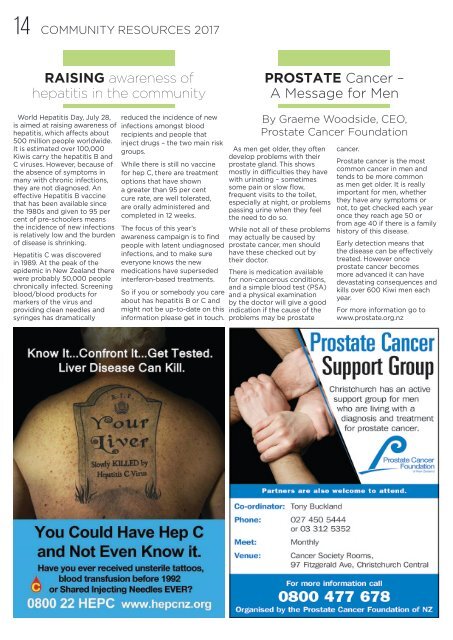Southern Destinations: June 22, 2017
Create successful ePaper yourself
Turn your PDF publications into a flip-book with our unique Google optimized e-Paper software.
14 community resources <strong>2017</strong><br />
raising awareness of<br />
hepatitis in the community<br />
ProstatE Cancer –<br />
A Message for Men<br />
World Hepatitis Day, July 28,<br />
is aimed at raising awareness of<br />
hepatitis, which affects about<br />
500 million people worldwide.<br />
It is estimated over 100,000<br />
Kiwis carry the hepatitis B and<br />
C viruses. However, because of<br />
the absence of symptoms in<br />
many with chronic infections,<br />
they are not diagnosed. An<br />
effective Hepatitis B vaccine<br />
that has been available since<br />
the 1980s and given to 95 per<br />
cent of pre-schoolers means<br />
the incidence of new infections<br />
is relatively low and the burden<br />
of disease is shrinking.<br />
Hepatitis C was discovered<br />
in 1989. At the peak of the<br />
epidemic in New Zealand there<br />
were probably 50,000 people<br />
chronically infected. Screening<br />
blood/blood products for<br />
markers of the virus and<br />
providing clean needles and<br />
syringes has dramatically<br />
reduced the incidence of new<br />
infections amongst blood<br />
recipients and people that<br />
inject drugs – the two main risk<br />
groups.<br />
While there is still no vaccine<br />
for hep C, there are treatment<br />
options that have shown<br />
a greater than 95 per cent<br />
cure rate, are well tolerated,<br />
are orally administered and<br />
completed in 12 weeks.<br />
The focus of this year’s<br />
awareness campaign is to find<br />
people with latent undiagnosed<br />
infections, and to make sure<br />
everyone knows the new<br />
medications have superseded<br />
interferon-based treatments.<br />
So if you or somebody you care<br />
about has hepatitis B or C and<br />
might not be up-to-date on this<br />
information please get in touch.<br />
By Graeme Woodside, CEo,<br />
Prostate Cancer Foundation<br />
As men get older, they often<br />
develop problems with their<br />
prostate gland. This shows<br />
mostly in difficulties they have<br />
with urinating – sometimes<br />
some pain or slow flow,<br />
frequent visits to the toilet,<br />
especially at night, or problems<br />
passing urine when they feel<br />
the need to do so.<br />
While not all of these problems<br />
may actually be caused by<br />
prostate cancer, men should<br />
have these checked out by<br />
their doctor.<br />
There is medication available<br />
for non-cancerous conditions,<br />
and a simple blood test (PSA)<br />
and a physical examination<br />
by the doctor will give a good<br />
indication if the cause of the<br />
problems may be prostate<br />
cancer.<br />
Prostate cancer is the most<br />
common cancer in men and<br />
tends to be more common<br />
as men get older. It is really<br />
important for men, whether<br />
they have any symptoms or<br />
not, to get checked each year<br />
once they reach age 50 or<br />
from age 40 if there is a family<br />
history of this disease.<br />
Early detection means that<br />
the disease can be effectively<br />
treated. However once<br />
prostate cancer becomes<br />
more advanced it can have<br />
devastating consequences and<br />
kills over 600 Kiwi men each<br />
year.<br />
For more information go to<br />
www.prostate.org.nz


















